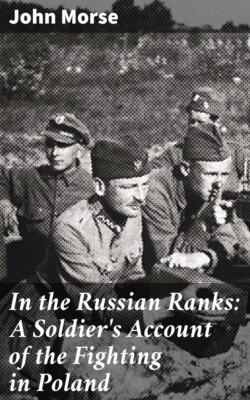Читать книгу In the Russian Ranks: A Soldier's Account of the Fighting in Poland - John Morse - Страница 10
На сайте Литреса книга снята с продажи.
CHAPTER VII
ОглавлениеTable of Contents
THE FIRST INVASION OF EAST PRUSSIA, AND THE RETREAT
By the 4th or 5th September it was pretty generally known, in that part of the Russian Army where I was, that something was going wrong with us. Great masses of infantry and artillery were formed eastward, behind, and on the right flank of the cavalry; and yet we made no further advance or progress in any direction. Some thought that our commanders were afraid of the garrison of the Koenigsberg forts, which was believed to number 150,000 men. I, and others engaged on outpost and scouting work, knew that German reinforcements were coming up rapidly, and that a large army was collecting on the Vistula between Marienburg and Thorn. These reinforcements, we knew, were coming from Belgium and the Western theatre of war, and also from the interior of Germany.
On our side reinforcements were coming up in great numbers; but at this period the chief fighting was on the Austrian-Russian frontier; and daily, and often almost hourly, news came to hand of the great victories which were being gained. It was asserted that in one day as many as 130,000 Austrian and Prussian prisoners were taken. The truth of these reports I had no means of ascertaining: nor of the many other rumours of the crushing victories of the Allies in the West, where the Germans were said to be retreating on all parts, and in many places, in disorderly rout. Now, eight months later, are they retreating at any point? Evidently mistakes were made; and it was not realized that the enemy was preparing a ring of defences which it would take many months to force. It was also said that the Germans were beginning to run short of ammunition. We soon had painful evidence that the Germans were short of nothing.
On the evening of the 5th September, they trapped one of our cavalry regiments and destroyed it, together with the greater part of a squadron of dragoons. Many of the men, including all the wounded, were taken prisoners.
On the 6th the enemy began to advance in force. The fighting consisted mostly of artillery duels at long ranges. While we were watching the action of some guns posted about two English miles away, a shell smashed to atoms the head and shoulders of an officer in the midst of our group, and we were splashed all over with his blood and brains—not a pleasant experience. The man must have been killed instantly, yet his hands and feet continued to twitch for some minutes after he was struck. It is remarkable that only one man was hurt, as we were standing close together under some trees, where we felt sure we were quite safe.
On the same day we began to retire, but slowly, and with much stubborn fighting. Nearly all the cavalry was drawn back from the front, and much of it must have been sent right away, as I never saw it again. The 5th Cossack division, however, remained; and for a long time was engaged in covering a portion of the 11th Army Corps.
